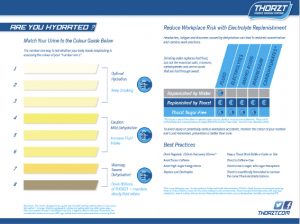Continuing from two weeks ago,
AMINO ACIDS
Branch Chain Amino Acids (Isoleucine, Leucine and Valine) play an essential role in protein synthesis and muscle building as well as recovery, accounting for over a third of Essential Amino Acids.
The addition of amino acids to carbohydrate-electrolyte drinks has been shown to increase fluid retention 15% greater than carbohydrate-electrolyte-only drinks, and 40% greater than water.11
During extended shifts, or demanding work, adequate levels of Branch Chain Amino Acids prevent excess serotonin from collecting in the brain. This can lead to drowsiness, clouding judgement and increasing the risk of a Loss Time Incident (LTI).
Glutamine, a non-essential amino acid, is the most abundant amino acid (building block of protein) in the body. When the body’s physiology is altered by factors, such as physical stress, its demands for extra glutamine can change drastically.
During extended periods of physical strain, glutamine is required by body organs in response to the increased stress levels. As a result, the body’s glutamine levels begin to plummet and additional glutamine is essential to maintain performance.
WHAT ARE ELECTROLYTES?
Electrolytes are naturally occurring essential minerals that control osmosis or movement of water within the body. Electrolytes also help maintain the acid-base balance required for normal cellular activities.
Common electrolytes include Potassium, Calcium, Sodium, Chloride and Magnesium. The body depends on electrolytes to perform vital functions by sending electrical signals from the brain to nerves that activate your muscles to perform mechanical functions. Maintaining this electrical capability and voltage output of cellular communication is dependent on electrolytes.
Most bodily functions require electrolytes, especially during neuromuscular processes. When the body loses fluid and electrolytes, both must be replaced for the body to rehydrate, retain fluid and return to efficient functioning before heat illness sets in.
Magnesium – The forgotten Electrolyte:
A common result of strenuous physical work or exercise is magnesium loss. According to research, a deficiency in magnesium may reduce physical performance and capacity as well as contribute to muscle cramps and weakness.
Vitamins
The B vitamins are also important for a normal appetite, good vision, healthy skin and nervous system, and red blood cell formation. They function as coenzymes that help the body obtain energy from food and drink. The body needs vitamin C, also known as ascorbic acid or ascorbate, to remain in proper working condition. Vitamin C benefits the body by holding cells together. Since our bodies cannot produce or store vitamin C, an adequate daily intake of this nutrient is essential for optimum health.12
References:
1. Kenefick RW, PhD. Hydration at the Worksite. American College of Nutrition Vol.26 No.5, 597S-603S
2. Wasterlund DS, Chaseling J, Burstrom L: The effect of fluid consumption on the forest workers’ performance strategy. Appl Ergon 35:29-36, 2004
3. Ganio, MS & Armstrong, LE.Mild Dehydration impairs cognitive performance and mood of men. British Journal of Nutrition / Volume 106 / Issue 10 / November 2011, pp 1535-1543
4. Armstrong LE, Ganio, MS. Mild Dehydration Affects Mood in Healthy Young Women. American Journal of Nutrition, Jan 1, 2012. jn.111.142000
5. Bean, Anita (2006). The Complete Guide to Sports Nutrition. A & C Black Publishers Ltd. pp. 81–83.
6. Brake, R & Bates GP. Fluid Losses and Hydration Status of Industrial Workers under Thermal Stress Working Extended Shifts. QLD Mining Industry Safety & Health Conf. August 2001
7. Drinkwise Australia: http://www.drinkwise.org.au/you-alcohol/alcohol-facts/drink-driving/
8. Sawka M N. Hydration Effects of thermoregulation and performance in the heat. In: Lau W M, ed. Proceedings of the International Conference on Physiological and Cognitive Performance in Extreme Environments, Defence Scientific and Technology Organisation, Australian Department of Defense, Canberra. 2000:21-23
9. Bishop PA, Pieroni RE, Smith JF, Constable SH: Limitations to heavy work at 21 degrees Cº of personnel wearing the US Military chemical defense ensemble. Aviat Space Environ Med 62:216-220, 1991
10. Sawka, M & Montain SJ: Fluid and Electrolyte Supplementation for Exercise Heat Stress. In: American Journal of Clinical Nutrition 2000;72(suppl):564S-72S
11. Seifert J, Harmon J, DeClercq P. Protein added to a sports drink improved fluid retention. Int J Sports Nutr Exerc Metab. 2006, 16, 16, 420-429.
12. http://extension.colostate.edu/topic-areas/nutrition-food-safety-health/water-soluble-vitamins-b-complex-and-vitamin-c-9-312/



